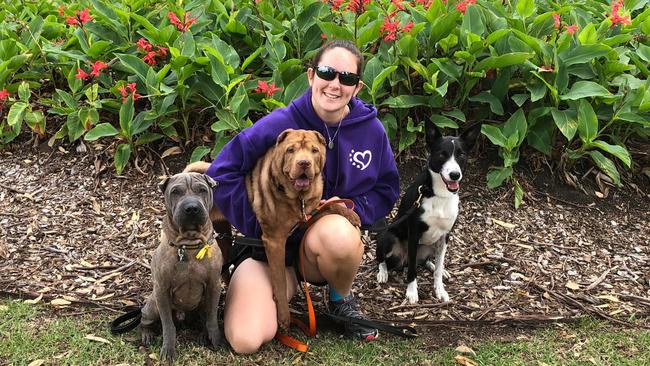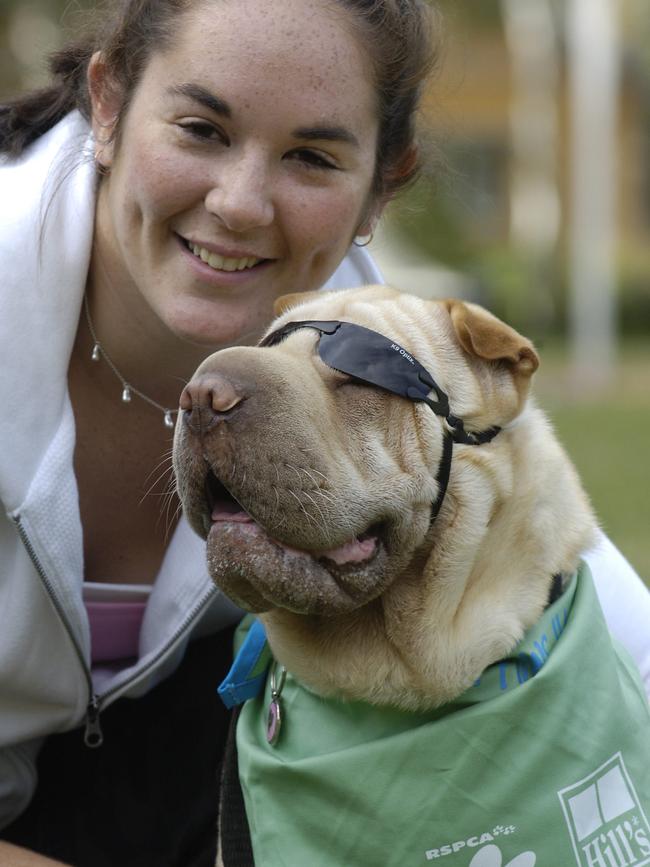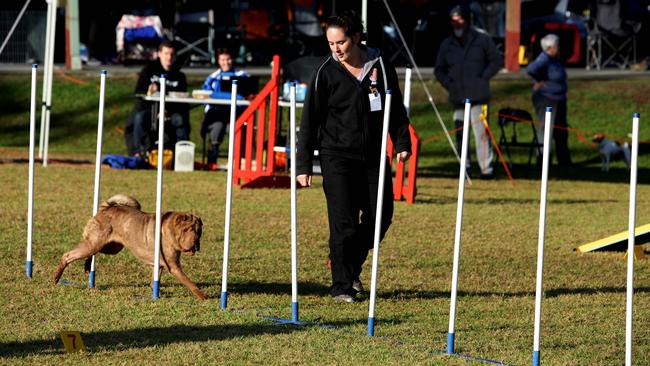Qantas service dog policy to be tested in Federal Court
A dog allowed to fly on Virgin and Rex was knocked back by Qantas for not meeting its assistance dog policy, in a move the owner says is disability discrimination.

Business
Don't miss out on the headlines from Business. Followed categories will be added to My News.
Qantas has been accused of disability discrimination for denying a dog trainer the right to take her “assistance” dog on board a flight.
Late last year, Rachael Fullerton was planning flights between Wagga Wagga and Sydney and contacted Qantas seeking permission for her dog Strike to accompany her as an accredited assistance animal.
Documents lodged in the Federal Court state Ms Fullerton has autism and complex post-traumatic stress disorder, and Strike assisted in mitigating the symptoms of her disabilities.
Ms Fullerton was previously accompanied by Strike on flights with Virgin Australia and Rex, and expected Qantas would also allow the short-haired border collie on board.

She informed Qantas that Strike was not certified under the Guide, Hearing and Assistance Dogs (GHAD) Act, nor was he trained by a full member of Assistance Dogs International — as required by the airline’s service dog policy.
However, Strike was registered with the New South Wales Pet Registry as an assistance animal and had completed temperament and public access tests through Verndogs and the Working Animals Federation of Australia.
“For the purposes of the Disability Discrimination Act, Strike is an assistance animal,” said the court documents filed by the Public Interest Advocacy Centre on Ms Fullerton’s behalf.
After receiving her request, Qantas indicated Ms Fullerton would need to complete a “more information” form, and supply supporting documentation if her dog was not certified under the GHAD Act.

Ms Fullerton then sought clarification from Qantas as to what further information was needed, beyond what she had already provided about Strike’s training and registration.
On at least four occasions, Qantas responded by re-sending the “more information” form, with Ms Fullerton eventually supplying her handler ID card, a NSW government-issued public transport card and photographic evidence of Strike’s travel on other airlines.
When she received no further response from Qantas, Ms Fullerton complained to the Human Rights Commission, which held a conciliation conference on April 3.
The complaint was then terminated in August on the basis there was no reasonable prospect of the matter being settled by conciliation, prompting the Federal Court action.
The lawsuit alleges Qantas treated Ms Fullerton less favourably than it would treat a person without her disability, by refusing to allow her to fly with Strike on the proposed flights.
Although Qantas does not allow passengers to bring dogs on board, Ms Fullerton’s lawyer argued she could only fly with Strike at her side, and therefore it was discriminatory to refuse her application.
It was requested that Qantas provide a written apology to Ms Fullerton, and pay damages by way of compensation for the “distress and humiliation” she suffered.
The Public Interest Advocacy Centre also sought an interlocutory order limiting the maximum costs each party could recover from the other party to $70,000.
The court was also asked to order Qantas to allow all persons with disabilities to be allowed to be accompanied by an assistance animal, that meets the definition of the Disability Discrimination Act.
Qantas is expected to defend the allegations, on the basis of its service dog policy, which was designed to ensure animals allowed in the cabin met minimum standards.
“We recognise the important role that properly trained assistance dogs perform for travellers with specific needs and Qantas carries many assistance dogs each year,” a spokesman for the airline said.
“Qantas consults with customers with disability who want to travel with an assistance dog in advance to obtain all relevant information to ensure it is safe to carry the dog in the aircraft cabin.”
The matter will be heard by Justice John Nicholas in the Federal Court in Sydney on Friday.
The Civil Aviation Safety Authority changed its guidelines for the carriage of animals in aircraft cabins in late 2021, handing responsibility for the decision to the pilot in command.
Despite the change, no domestic airlines have yet relaxed their approach to the carriage of animals, requiring all but service dogs to travel in the cargo hold.
More Coverage
Originally published as Qantas service dog policy to be tested in Federal Court





